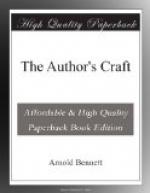And indeed it is natural that managers should talk thus, seeing the low state of the drama, because in any art rules and reaction always flourish when creative energy is sick. The mandarins have ever said and will ever say that a technique which does not correspond with their own is no technique, but simple clumsiness. There are some seven situations in the customary drama, and a play which does not contain at least one of those situations in each act will be condemned as “undramatic,” or “thin,” or as being “all talk.” It may contain half a hundred other situations, but for the mandarin a situation which is not one of the seven is not a situation. Similarly there are some dozen character types in the customary drama, and all original—that is, truthful—characterisation will be dismissed as a total absence of characterisation because it does not reproduce any of these dozen types. Thus every truly original play is bound to be indicted for bad technique. The author is bound to be told that what he has written may be marvellously clever, but that it is not a play. I remember the day—and it is not long ago—when even so experienced and sincere a critic as William Archer used to argue that if the “intellectual” drama did not succeed with the general public, it was because its technique was not up to the level of the technique of the commercial drama! Perhaps he has changed his opinion since then. Heaven knows that the so-called “intellectual” drama is amateurish enough, but nearly all literary art is amateurish, and assuredly no intellectual drama could hope to compete in clumsiness with some of the most successful commercial plays of modern times. I tremble to think what the mandarins and William Archer would say to the technique of Hamlet, could it by some miracle be brought forward as a new piece by a Mr Shakspere. They would probably recommend Mr Shakspere to consider the ways of Sardou, Henri Bernstein, and Sir Herbert Tree, and be wise. Most positively they would assert that Hamlet was not a play. And their pupils of the daily press would point out—what surely Mr Shakspere ought to have perceived for himself—that the second, third, or fourth act might be cut wholesale without the slightest loss to the piece.
In the sense in which mandarins understand the word technique, there is no technique special to the stage except that which concerns the moving of solid human bodies to and fro, and the limitations of the human senses. The dramatist must not expect his audience to be able to see or hear two things at once, nor to be incapable of fatigue. And he must not expect his interpreters to stroll round or come on or go off in a satisfactory manner unless he provides them with satisfactory reasons for strolling round, coming on, or going off. Lastly, he must not expect his interpreters to achieve physical impossibilities. The dramatist who sends a pretty woman off in street attire and seeks to bring her on again in thirty seconds fully dressed for a court ball may fail in stage technique, but he has not proved that stage technique is tremendously difficult; he has proved something quite else.




